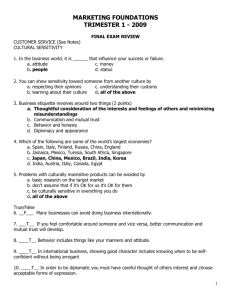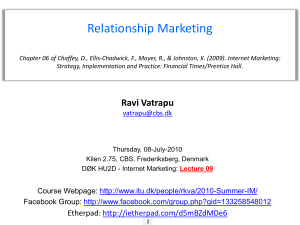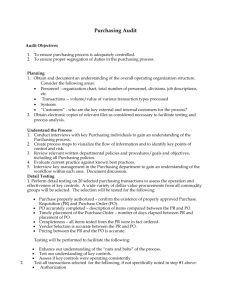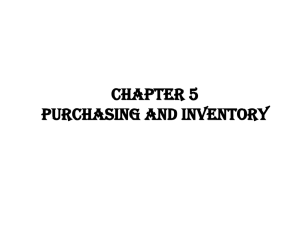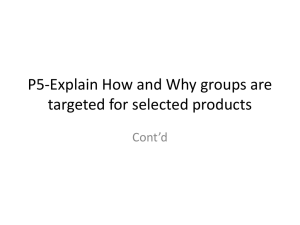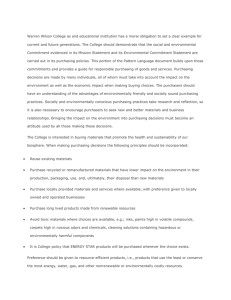International B2B Marketing
advertisement
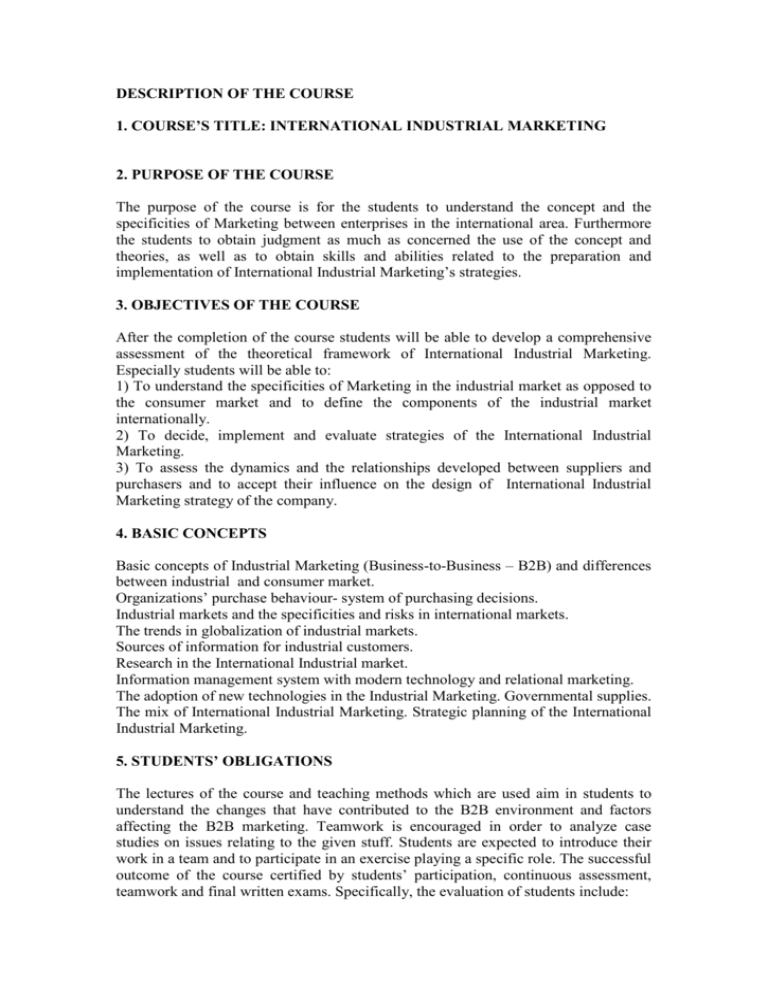
DESCRIPTION OF THE COURSE 1. COURSE’S TITLE: INTERNATIONAL INDUSTRIAL MARKETING 2. PURPOSE OF THE COURSE The purpose of the course is for the students to understand the concept and the specificities of Marketing between enterprises in the international area. Furthermore the students to obtain judgment as much as concerned the use of the concept and theories, as well as to obtain skills and abilities related to the preparation and implementation of International Industrial Marketing’s strategies. 3. OBJECTIVES OF THE COURSE After the completion of the course students will be able to develop a comprehensive assessment of the theoretical framework of International Industrial Marketing. Especially students will be able to: 1) To understand the specificities of Marketing in the industrial market as opposed to the consumer market and to define the components of the industrial market internationally. 2) To decide, implement and evaluate strategies of the International Industrial Marketing. 3) To assess the dynamics and the relationships developed between suppliers and purchasers and to accept their influence on the design of International Industrial Marketing strategy of the company. 4. BASIC CONCEPTS Basic concepts of Industrial Marketing (Business-to-Business – B2B) and differences between industrial and consumer market. Organizations’ purchase behaviour- system of purchasing decisions. Industrial markets and the specificities and risks in international markets. The trends in globalization of industrial markets. Sources of information for industrial customers. Research in the International Industrial market. Information management system with modern technology and relational marketing. The adoption of new technologies in the Industrial Marketing. Governmental supplies. The mix of International Industrial Marketing. Strategic planning of the International Industrial Marketing. 5. STUDENTS’ OBLIGATIONS The lectures of the course and teaching methods which are used aim in students to understand the changes that have contributed to the B2B environment and factors affecting the B2B marketing. Teamwork is encouraged in order to analyze case studies on issues relating to the given stuff. Students are expected to introduce their work in a team and to participate in an exercise playing a specific role. The successful outcome of the course certified by students’ participation, continuous assessment, teamwork and final written exams. Specifically, the evaluation of students include: 1. Teamwork, which is valued within 40% of the course’s total score. 2. Final exams. The 60% of the course’s total score. 5. ANALYTICAL SCHEDULE OF THE TAUGHT MATERIAL 1st Week Basic concept of Industrial Marketing: Industrial Marketing, consumer and industrial products, consumer and industrial marketing, differences of consumer and industrial marketing. 2nd Week Industrial markets: Industrial customers, specificities of industrial markets, the environment of Industrial Marketing. The specificities and the risks in international markets. The trends in globalization of industrial markets. 3rd Week Organization’s purchasing behaviour, system of purchasing decisions: System of taking decisions in the Industrial Marketing. The poles in the system of taking purchasing decisions in Industrial Marketing. Factors that affect the purchasing decision in Industrial Marketing. Process of taking purchasing decisions for industrial products. Types of purchasing activities in Industrial Marketing. Marketing Strategies for the purchasing activities and the stages of the process of taking purchasing decisions. Information sources that are used from members of the Taking purchasing decisions’ system. 4th Week Strategic planning of Industrial Marketing and segmentation of industrial market. Industrial Marketing and governmental supplies: Introduction to the strategic planning, analysis of external and internal environment. Process of Industrial Marketing’s strategic planning. The necessity and usefulness of segmentation. Segmentation of two stages and main factors of industrial markets’ segmentation. Two-step segmentation using the “foleaki” approach. The effect of the economic environment on business trading. Transaction between enterprises inside the Greek economy. Procurement in the public sector. The institutional framework of procurement in the public sector. 5th Week Research in International Industrial market. Information management systems with modern technology and relational marketing: The basis for the research of Industrial Marketing. Stages of the process of Industrial Marketing’s research. Relating Marketing. Customer relationship management/ marketing (CRM). Different approach for CRM. Appliance fields, advantages, disadvantages of CRM. Problems, modern trends and progress of CRM. 6th Week The product and the distribution in Industrial Marketing: The importance of industrial products. Administration and revitalization of existing industrial products. The distribution within the marketing mix. Marketing distribution functions, main forms of intermediate, forms of industrial channels. Design, selection and management of distribution channels. 7th Week Pricing and Promotion in Industrial Marketing: The importance of pricing in Industrial Marketing. In-house and external factors determine the price. Procedures, processes and pricing policies. The mixture promotion in industrial marketing. Sales promotion, advertising, direct marketing, public relations and personal selling. 6. ESSENTIAL BIBLIOGRAPHY Tomaras Petros. «Industrial Marketing». Published by the author. Athens, 2009 (ISBN: 978960-90674-3-0). SUGESTING BIBLIOGRAPHY 1. Ames B. C. (1958), “Marketing Planning for Industrial Products”, Harvard Business Review, Vol.46 (5) 2. Bonoma V. T., and Shapiro P. B. (1983), Segmenting the Industrial Market, Lexington Books, USA, Washington D.C. 3. Cateora, Ph. And Graham, J. (2003) International Marketing, A and B, Papazisis edition. 4. Cox E. W. Jr (1979), Industrial Marketing Research, John Wiley and Sons, USA, New York 5. Hutt D. M., and Speh W. T. (1992), Business Marketing Management, A Strategic View of Industrial and Organizational Markets, 4th Edition, The Dryden Press, USA, Florida 6. Johansson, K. J., (2005) Global Marketing: Foreign Entry, Local Marketing, and Global Management, 4th edition, McGraw- Hill/Irwin 7. Muhlbacher, H., Leiths, H and Dahringer, L. (2006) International Marketing: A Global Perspective. 3rd edition, Thomson Learning 8. Peppers, D., Rogers, M and Dorf, B. (1999). “Is your company ready for one-toone marketing?” Harvard Business Review, Vol. 77, No 1 9. Reeder R. R., Brierty G. E., and Reeder H. B. (1991), Industrial Marketing: analysis, Planning and Control, 2nd Edition, Prentice Hall International, USA. New Jersey 10. Ross Brennan, Louise Canning and Raymond McDowell (2007), Business-toBusiness Marketing, Sage Publications Ltd 11. Sandhusen, International Marketing, 2003, Klidarithmos Edition 12. Sandhusen, (2003), Marketing in International Market and in the Internet, Klidarithmos Edition 13. Webster E. F. Jr (2001), Industrial Marketing Strategy, 3rd Edition, John Wiley & Sons, USA, New York 14. Wind Y., and Cardozo N. R. (1974), “Industrial Marketing Segmentation”, Industrial Marketing Management, Vol 3 (2) 15. Wright R., (2004), Business to Business Marketing, A step by step guide, Prentice Hall 16. Zhibin Gu, G. and Gunder Frank, A. (2006), China’s Global Reach: Markets, Multinationals, amd Globanization, Fultus Corporation


